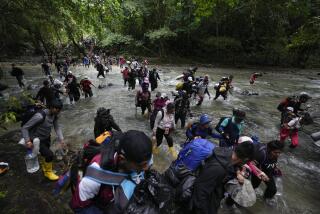Reagan Nicaragua Efforts Hampered by Latin Unity
MANAGUA, Nicaragua — The signing last month of a border agreement between Nicaragua and Costa Rica, with the backing of four other Latin American countries, is the latest in a series of events that have frustrated President Reagan’s efforts to isolate Nicaragua from its neighbors.
Diplomats and political observers in the region say there is increasing Latin American unity against Reagan’s Nicaragua policy. But they say that although this unity may make the policy more difficult to implement, it is unlikely to force Reagan to make any policy changes.
“We have seen a growth in Latin American solidarity in opposition to U.S. policy in Nicaragua,” one diplomat said, asking not to be identified by name. “At first I thought there would be fallout from that, but now I really don’t think Washington gives a damn about what Latin America thinks about what it’s doing in Nicaragua.”
The Reagan Administration considers the Marxist-led Sandinista government to be undemocratic and made up of Soviet-backed Communists who must be pressed into relinquishing power or sharing it with Nicaraguan rebels, the so-called contras. Last Tuesday, Reagan asked for $100 million in aid for the contras, who are trying to overthrow the Sandinista government from bases in Honduras, Costa Rica and Nicaragua.
Latin Americans are nervous about the militarization of Central America. Latin opposition to Reagan’s policy mounted last May when Reagan imposed an economic embargo against Nicaragua. The opposition was broadened in the summer when Argentina, Peru, Brazil and Uruguay banded together in support of Mexico, Panama, Colombia and Venezuela, the so-called Contadora Group of countries that have been trying since 1983 to bring about a peaceful settlement of Central American conflicts through diplomatic mediation.
Many Latin American countries have voiced opposition to U.S. help for the contras. As word circulated about Reagan’s intentions to seek military assistance for the rebels--last year the United States pledged them $27 million in non-military aid--some Latin American countries stepped up their opposition.
Venezuelan Document
In a move to revitalize the Contadora process, the eight nations that make up the Contadora Group and its supporters got together in January in Caraballeda, Venezuela. They signed a document calling for resumption of bilateral talks between the United States and Nicaragua, an end to foreign aid for irregular forces and insurrectional movements in the region and a resumption of the Contadora peace talks, which had been suspended in December at Nicaragua’s request.
A year earlier, the United States had ended a short series of bilateral talks with Nicaragua, accusing the Sandinistas of seeking a separate pact with the United States as a way of avoiding talks with their Central American neighbors through the Contadora Group.
At the inauguration of Guatemalan President Vinicio Cerezo in January, five Central American countries signed a letter backing the Caraballeda document and agreeing to resume the Contadora peace talks. Besides Guatemala and Nicaragua, signers were El Salvador, Honduras and Costa Rica, which depend heavily on U.S. aid and generally support U.S. policy on Nicaragua.
Cerezo offered Guatemala as the site for a May conference of the Central American presidents, including Nicaraguan President Daniel Ortega. Cerezo has vowed “active neutrality” in Central America.
On Jan. 16, the ambassadors in Washington of the four Contadora countries and their four-nation support group called on Secretary of State George P. Shultz, asking that the United States resume bilateral talks with Nicaragua. Shultz rejected the request, reiterating the reason they were ended originally.
Foreign Ministers’ Lobby
On Feb. 10, the foreign ministers of the same countries met with Shultz in Washington to lobby against aid for the contras. According to diplomatic sources, Shultz listened to them, but the Administration has nevertheless requested $100 million in aid to the contras.
In Punta del Este, Uruguay, last week, Uruguayan President Julio Maria Sanguinetti opened a meeting of the Contadora Group and its supporters with a renewed expression of opposition to U.S. aid for the Nicaraguan rebels.
Meanwhile, Honduras’ new president, Jose Azcona Hoyo, has become slightly more conciliatory toward Nicaragua than his predecessor, who cooperated with the United States in its backing for the contras to such an extent that the country is sometimes referred to in Central America as “the USS Honduras.” Azcona, however, is not expected to change Honduras’ policy toward the contras or toward the United States.
A bigger shift in attitude can be seen in Costa Rica, now that its presidential election campaign is over--a campaign in which anti-Sandinista sentiment figured prominently. Since the Feb. 2 election, Costa Rican President-elect Oscar Arias Sanchez has spoken out against aid to the contras.
Administration Argument
The Reagan Administration argues that Nicaragua is trying to export its revolution and is a threat to its neighbors. Diplomats in this region say that the Administration opposes all bilateral agreements with the Nicaraguans, believing that such agreements jeopardize the chances for a multilateral agreement.
The agreement for an international peacekeeping commission on the Costa Rican-Nicaraguan border, announced last Monday, “is just the opposite of what the American position has always been, which is that there needs to be a regional settlement,” a diplomatic source said.
“It appears,” another source said, “that Costa Rica is prepared to accept a policy of containment of Nicaragua, whereas the United States wouldn’t settle for containment. They would see that as a consolidation of Nicaragua as another Cuba on the mainland.”
The peacekeeping commission is to include a permanent border monitoring team made up of civilian personnel, the four Contadora countries and the four support nations decided Friday at their meeting in Uruguay. The monitoring body will be international in character, the eight countries said in a statement, but they did not say whether all of their countries would contribute people to it.
The border has been a special source of friction between Nicaragua and Costa Rica during the past three years. There have been incidents between the Nicaraguan army and Costa Rican Civil Guard and between the Nicaraguan army and Nicaraguan rebels operating out of Costa Rica.
Diplomatic Conflict
Costa Rica and Nicaragua had downgraded their diplomatic ties in May over the shooting of two Costa Rican civil guardsmen. Nicaraguan President Ortega recently accepted responsibility for the incident, and full diplomatic relations were resumed.
The size of the border commission has not been decided, but it is unlikely to be large enough to detect all possible moves of rebel elements across the Costa Rican-Nicaraguan border.
Some observers say that the commission will be an impediment to the contras’ operations because it will focus the attention of the world on their presence in Costa Rica. The Costa Rican government, like the Honduran government, publicly denies that rebels operate from its territory.
The agreement also is important for the precedent it sets. Observers say the Costa Ricans have not learned to love the Sandinistas but have made a pragmatic decision to normalize relations with Nicaragua.
Major Issues Unresolved
“It represents one country in the region that is prepared to reach an agreement with the Nicaraguans, and that hasn’t happened before,” a diplomat said.
The major issues among the Central American countries that have prevented a Contadora peace settlement are no closer to being resolved. One of these issues is disagreement over provisions of a draft treaty regulating the balance of military forces in the region. Another is the draft provisions concerned with border security and treaty verification.
Moreover, Nicaragua insists that the United States must stop backing the contras before it will sign a regional peace accord.
In addition, Contadora Group diplomats accuse the United States of not being sincere in its expressions of support for the Contadora process. They believe that countries such as El Salvador and Honduras that depend on U.S. assistance would be more willing to come to terms if Washington put pressure on them to do so. They also believe that the process would be advanced if the United States negotiated directly with Nicaragua.
More to Read
Sign up for Essential California
The most important California stories and recommendations in your inbox every morning.
You may occasionally receive promotional content from the Los Angeles Times.










